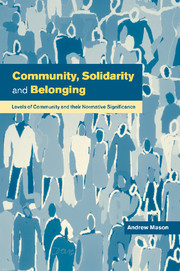Conclusion
Published online by Cambridge University Press: 22 September 2009
Summary
This book began with the observation that the term ‘community’ is employed in a variety of different contexts for a variety of different purposes, and that we do not possess a clear view of its different uses. In response I introduced a number of distinctions with the hope of disentangling some of the different strands of the notion. I contrasted what I called the ordinary concept of community with the moralized concept, distinguished between levels and kinds of community, and between aspects and degrees of community. The structure provided by these distinctions was employed to make sense of our talk about community and to understand the purposes which it serves.
The distinction between levels and kinds of community also enabled us to focus an important question which the debate between liberals and communitarians has shown that we need to take seriously, viz. what kind of community, if any, is ideal at the level of the state and what steps may the state legitimately take to promote it? I began by considering the dominant liberal answer to that question. The dominant liberal conception of political community maintains that we should aspire to a community in which citizens identify with their major institutions because they each converge on the principles that underlie them.
- Type
- Chapter
- Information
- Community, Solidarity and BelongingLevels of Community and their Normative Significance, pp. 224 - 227Publisher: Cambridge University PressPrint publication year: 2000
- 2
- Cited by



